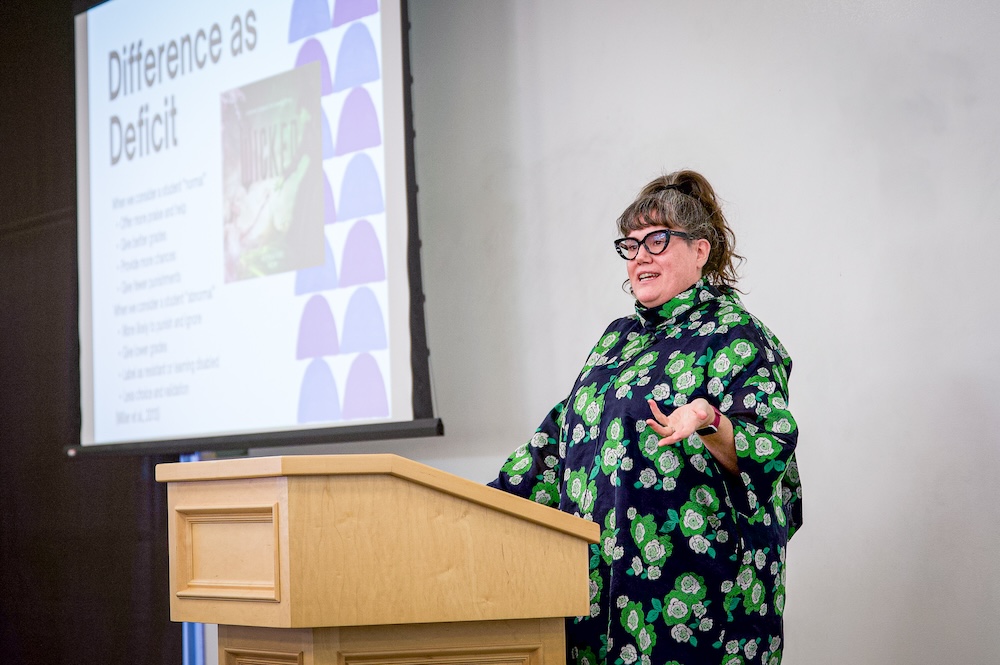2024 Dean's Distinguished Speaker Series closes with Kara Mitchell Viesca
 Kara Mitchell Viesca, a renowned multilingual teacher-education scholar, delivered the last CoEdu Dean’s
Distinguished Speaker Series lecture of 2024: “Co-imagining/Creating Transformative Educational Futures in a Shifting Global Landscape
Through Social Design-based Teacher Education Research Collectives.” Dean Laanan and Verónica E. Valdez, Chair of Education, Culture & Society, welcomed Viesca to the SAEC stage.
Kara Mitchell Viesca, a renowned multilingual teacher-education scholar, delivered the last CoEdu Dean’s
Distinguished Speaker Series lecture of 2024: “Co-imagining/Creating Transformative Educational Futures in a Shifting Global Landscape
Through Social Design-based Teacher Education Research Collectives.” Dean Laanan and Verónica E. Valdez, Chair of Education, Culture & Society, welcomed Viesca to the SAEC stage.
After years conducting international research and teaching at the University of Nebraska-Lincoln, the invitation to address our CoE community brought Professor Viesca back to her Utah roots. Her talk built momentum as Viesca described the different narratives around her Latter-Day Saint and Indigenous heritage.
“We need to do a much better job of accounting for those narratives and bridging across those narratives in order to move forward,” she said. Language plays a key role. While some may have lauded her great grandmother as a Mormon “Sacagawea,” some contemporary academics see her grandmother’s life as an early historical example of missing and murdered Indigenous women, Viesca said. And the narrative with the most power often wins out.
But teacher education proves pivotal in creating different futures for students. “For us in schools and in classrooms, we have to do a lot more work to be able to recognize these different narratives, not just in history but in what’s happening in our spaces that we’re engaging in.”
Viesca moved on to describe her work in teaching multicultural education, where different and equally legitimate perspectives on the same issues create complexities in terms of power and decision-making. “The systems that we work in can shape us in particular ways to see particular things…how do we know if we’re the one with the restricted view or not? …some ideas are controlling the opportunities of others and getting in the way of self-actualization.”
To the audience’s audible delight, Viesca even made parallels with her argument and the movie Wicked. She asked: “What are the different perspectives that will help us have a fuller understanding of the people involved, humanize them, and better focus on learning?” before calling for multilingual teacher scholars to “flip the script.”
Viesca went on to describe two branches of her research, one with direct ties to the College of Education. First, Viesca shared how she and her colleagues across Finland, Germany, Norway, England, and the United States are asking “How do you make difference both positive and productive in your classrooms?” To her surprise, they have found that barriers in K-12 classrooms are actually quite similar across these five countries. But so are the possibilities: potential futures grounded in collaborative decision-making and centering agency for teachers and students in solving problems.
Viesca’s research doesn’t stop there. She is also part of the national team called the Teaching and Learning Coalition for Multilingual Education (TLC4ME), which the College of Education hosted for a retreat during the summer of 2024. ECS faculty Verónica E. Valdez, Wenyang Sun, and Tuba Yilmaz are also part of the coalition, along with 40 other members reaching into Canada and Finland. The collective’s goal is to “engage in breakthrough endeavors that matter locally but can be thoughtful nationally.” TLC4ME recently conducted an extensive literature review that revealed how much multilingual education is focused heavily on English; many such studies took place within the last eight years.
To close, Viesca asked, citing the work of scholar Kris Gutiérrez, “What if we organized teacher education as social design-based experiments?” which are co-constructed and co-imagined, hearkening back to the title of her talk, and provide a framework for moving forward in K-12 multilingual education.
